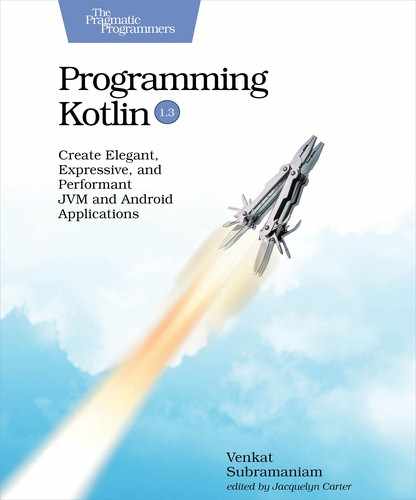More Expressions, Fewer Statements
Languages like Java, C#, and JavaScript have more statements than expressions—if statement, for statement, try, and so on. On the other hand, languages like Ruby, F#, Groovy, Haskell, and many others have more expressions than statements. Let’s discuss which is better before we discuss Kotlin’s preference.
While statements are prevalent, they have a dark side—they don’t return anything and have side effects. A side effect is a change of state: mutating a variable, writing to a file, updating to a database, sending data to a remote web service, corrupting the hard drive… Expressions are much nicer—they return a result and don’t have to modify any state in order to be useful.
Let’s look at an example to see the difference. Let’s write a piece of Kotlin code as we would in languages like Java and C#:
| | fun canVote(name: String, age: Int): String { |
| | var status: String |
| | |
| | if (age > 17) { |
| | status = "yes, please vote" |
| | } else { |
| | status = "nope, please come back" |
| | } |
| | |
| | return "$name, $status" |
| | } |
| | |
| | println(canVote("Eve", 12)) |
The canVote() method uses if like a statement. Since statements don’t return anything, the only way we can get any useful result out of it for further processing is to set up a mutable variable and modify its value within the branches.
In Kotlin, however, if is an expression. We can use the result of the call to if for further processing. Let’s rework the previous code, to use if as an expression instead of a statement:
| | val status = if (age > 17) "yes, please vote" else "nope, please come back" |
| | |
| | return "$name, $status" |
We were able to use val instead of var since we’re not mutating a variable. And we were able to use type inference for status, since the value is known from the if expression. The code is less noisy and less error prone as well.
Kotlin also treats try-catch as an expression. The last expression within the try part becomes the result if there was no exception; otherwise, the last statement within the catch becomes the result.
Here’s an example of try-catch-finally being used as an expression.
| | fun tryExpr(blowup: Boolean): Int { |
| | return try { |
| | if (blowup) { |
| | throw RuntimeException("fail") |
| | } |
| | |
| | 2 |
| | } catch(ex: Exception) { |
| | 4 |
| | } finally { |
| | //... |
| | } |
| | } |
| | |
| | println(tryExpr(false)) //2 |
| | println(tryExpr(true)) //4 |
There’s one surprise, though. While Java treats assignment as an expression, Kotlin doesn’t. If variables a, b, and c are defined using var with some integer values, like, 1, 2, and 3 respectively, the following code will fail compilation in Kotlin:
| | a = b = c //ERROR |
One reason for this behavior, of not treating = as an expression, is that Kotlin allows you to intercept both gets and sets on variables with delegates, as we’ll see later in the book. If = were treated as an expression, then chaining of assignments may lead to unexpected and complex behavior that may be confusing and turn into a source of errors.
